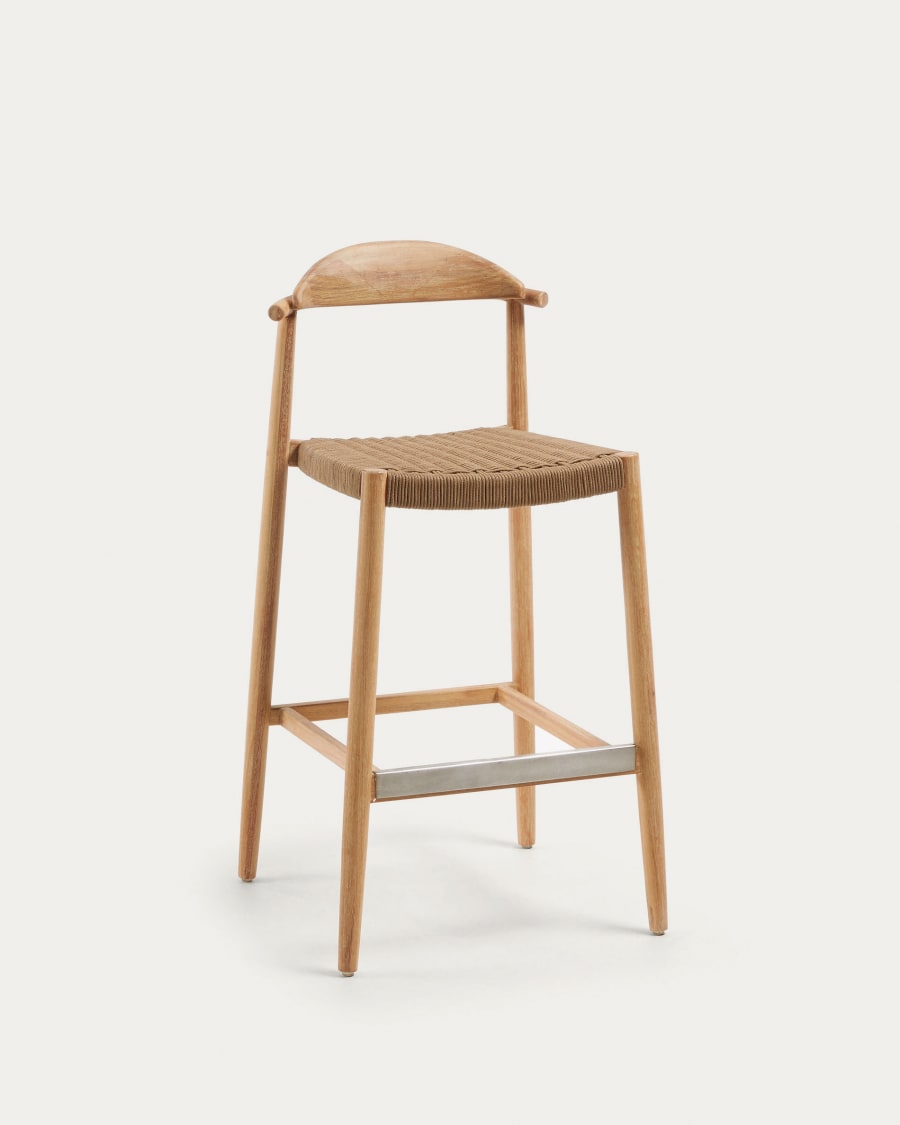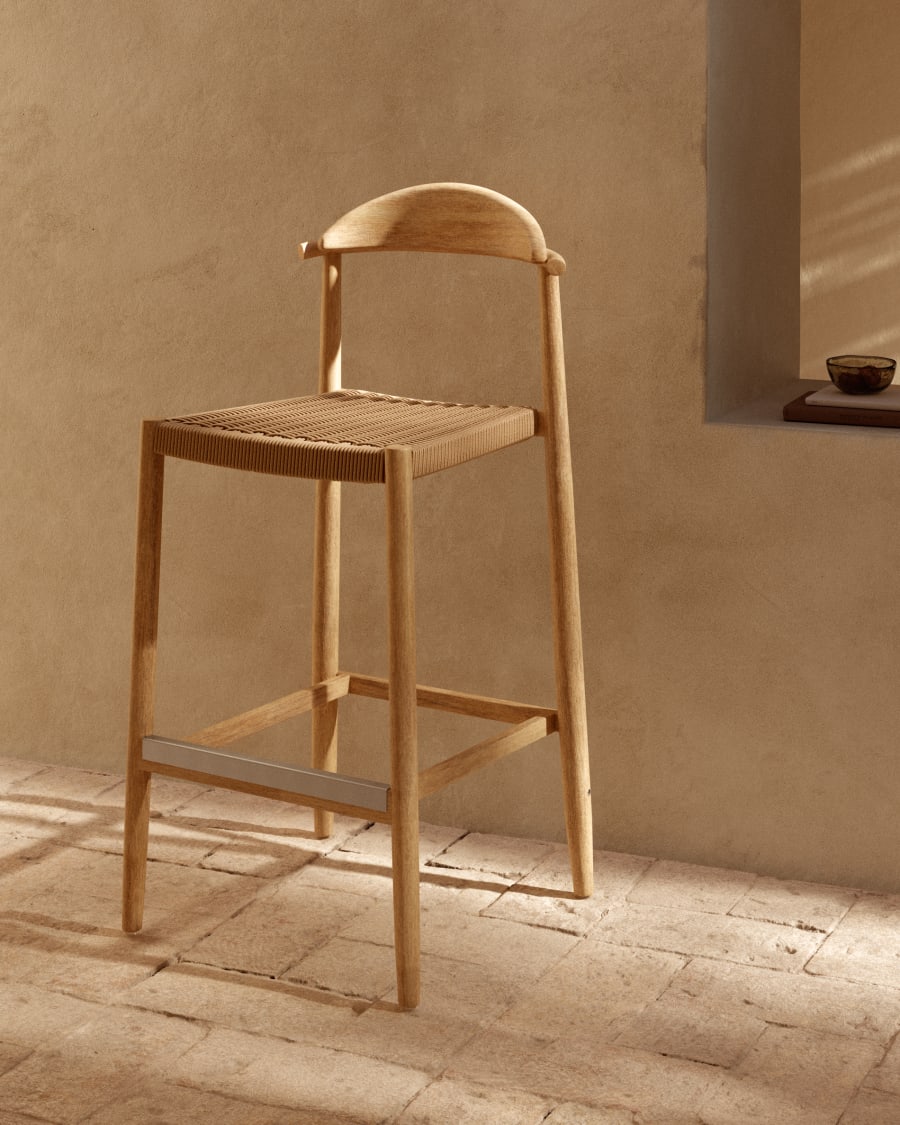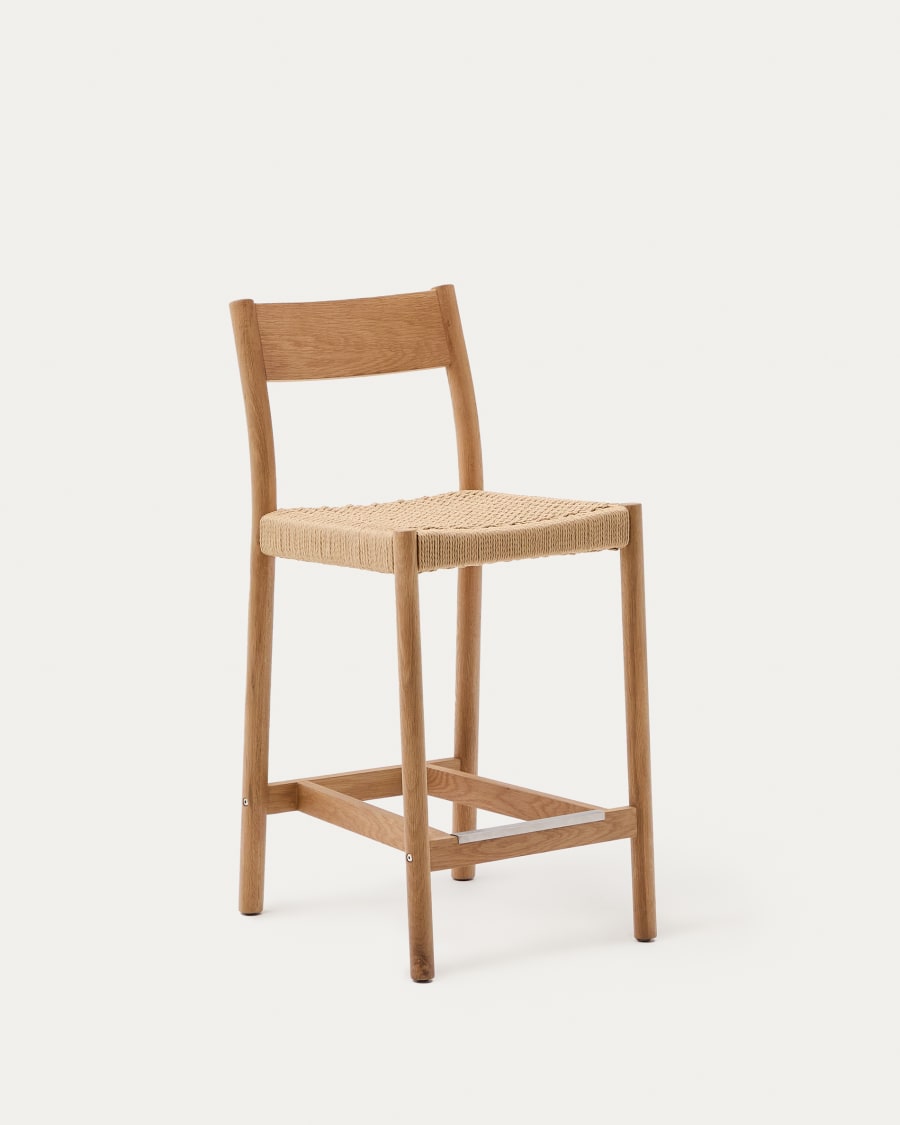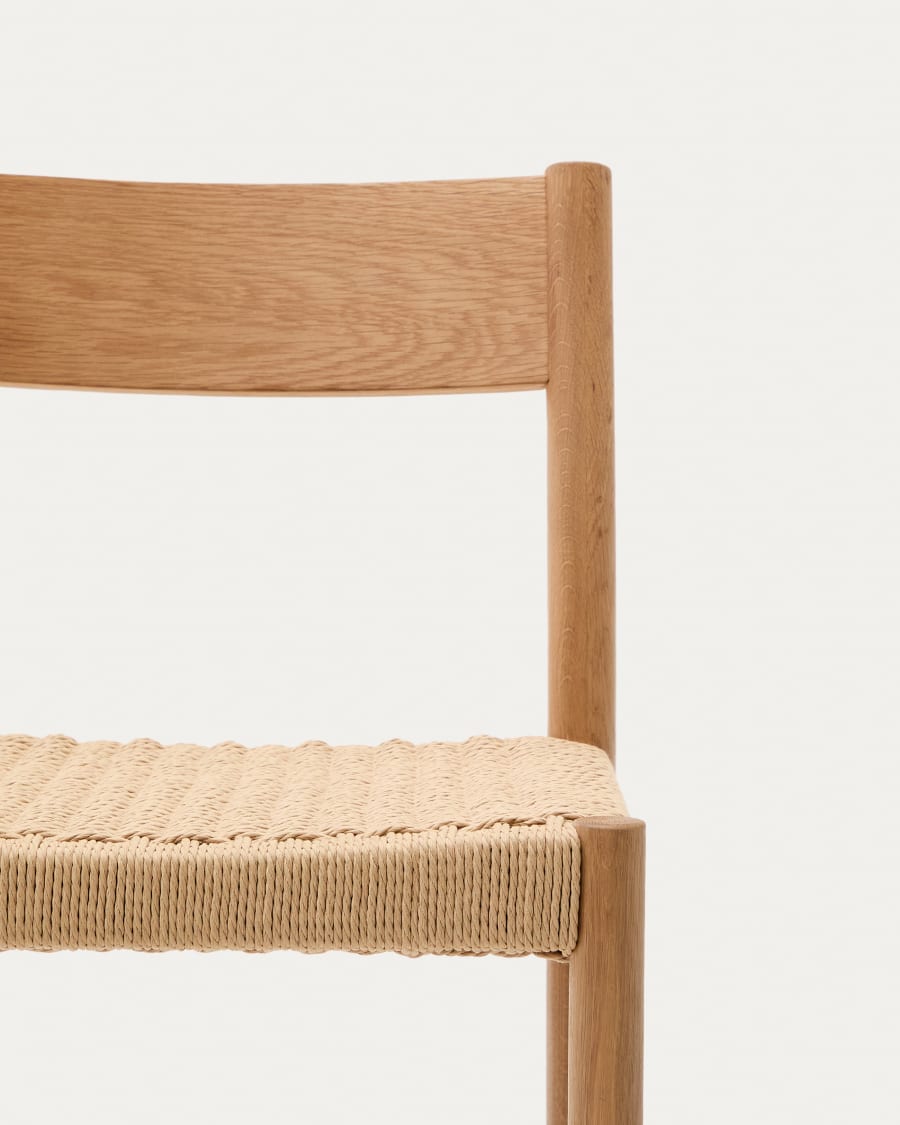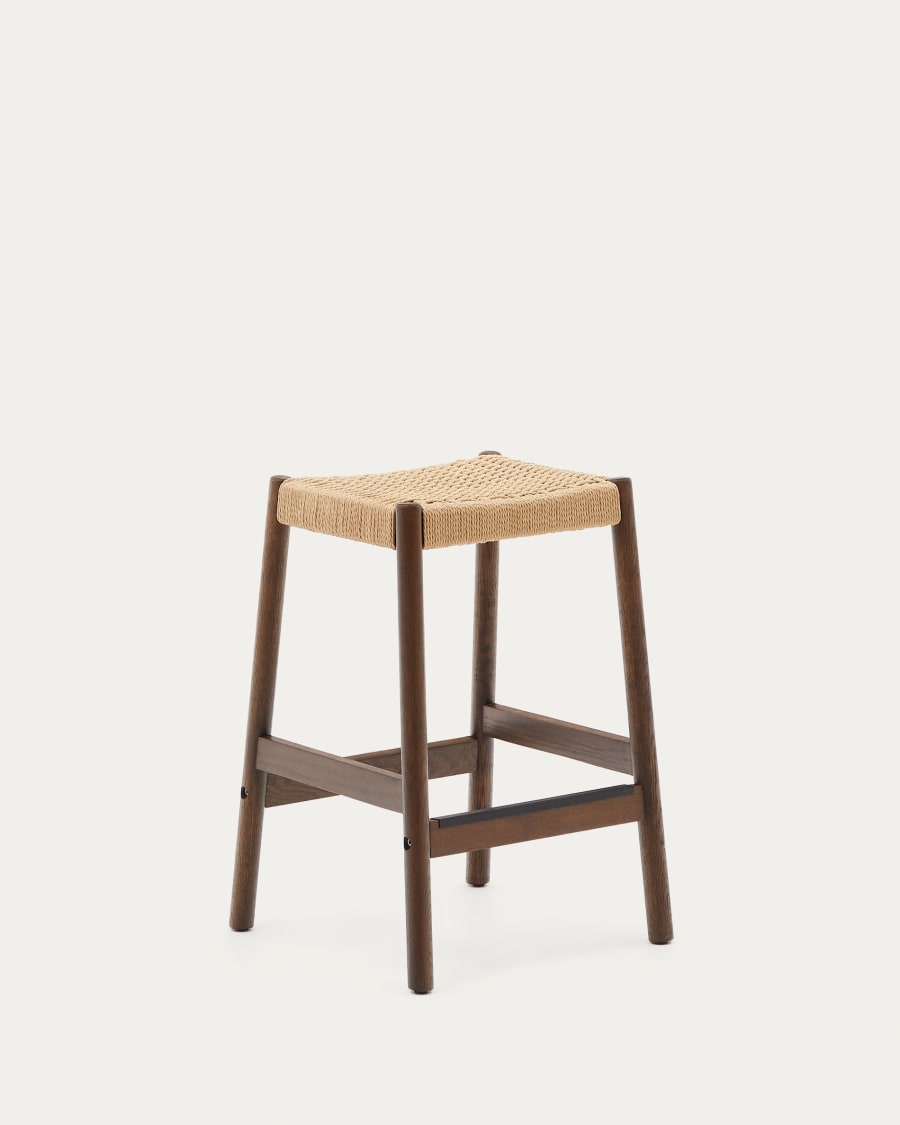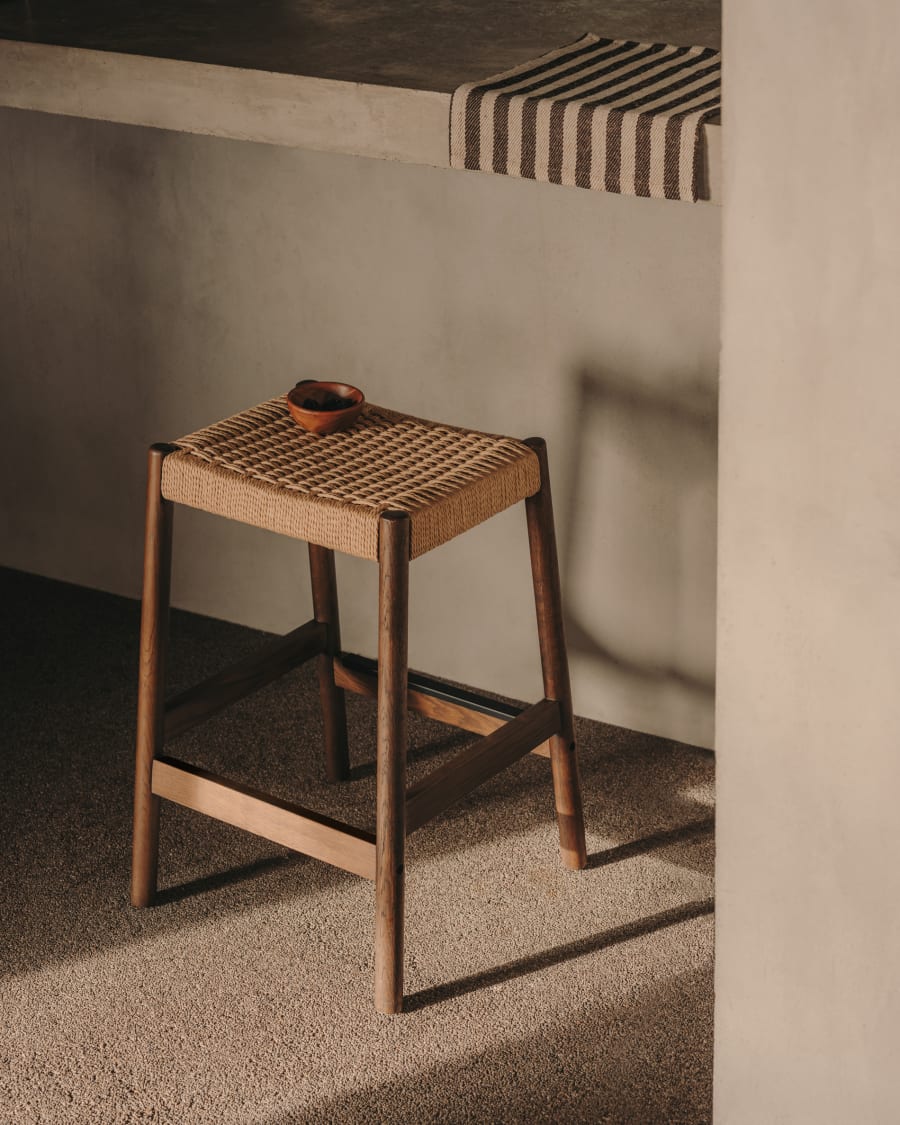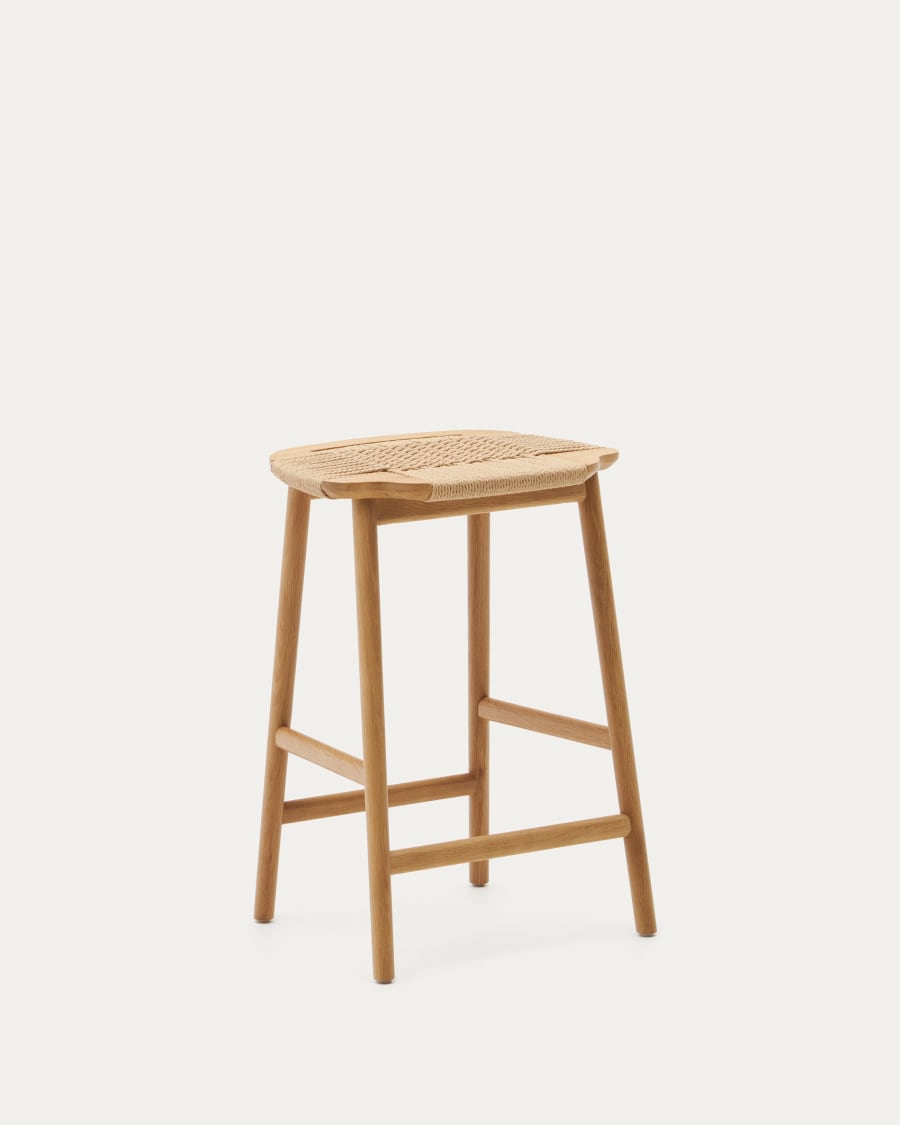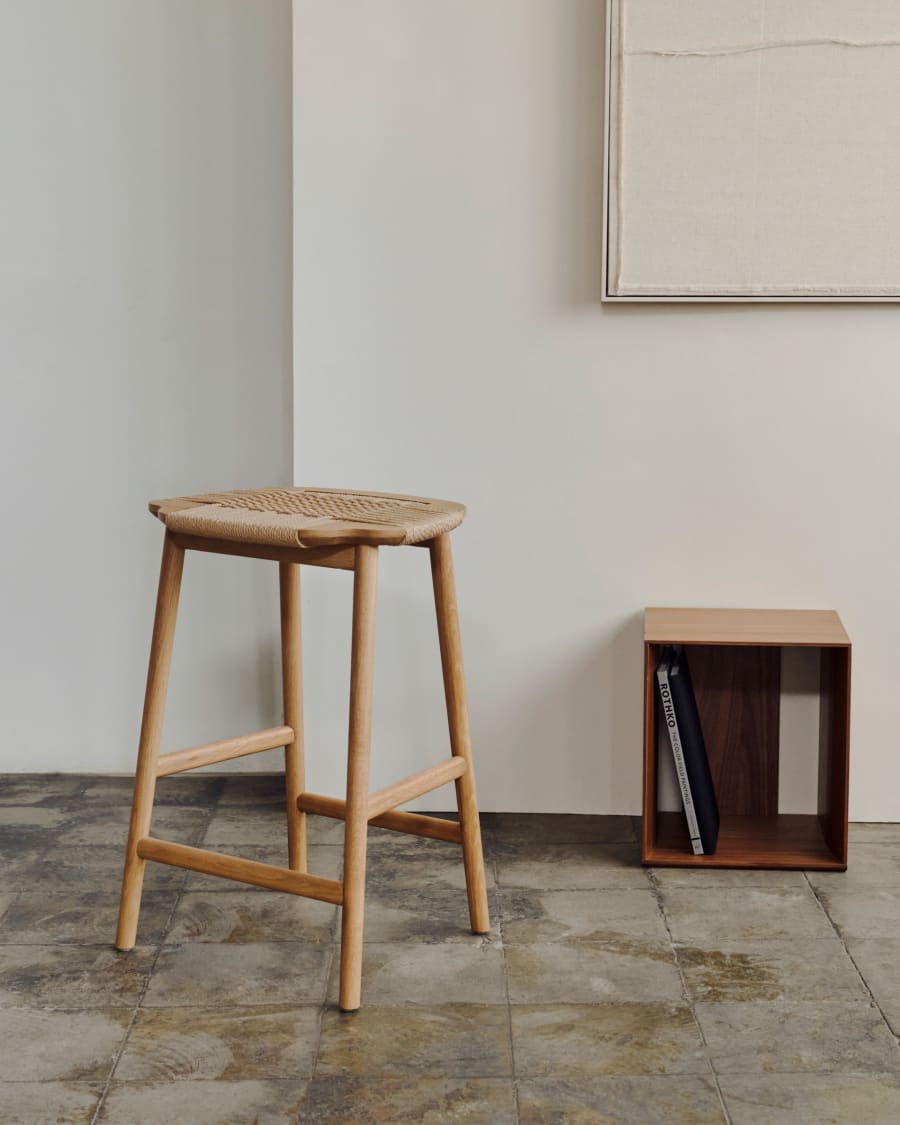- Home
- Japandi Stool Chairs
Japandi Stool Chairs
Japandi Stools Collection: Scandinavian & Japanese Design
Japandi stool chairs merge Japanese wabi-sabi and Scandinavian hygge, creating a timeless aesthetic. This design philosophy prioritizes clean lines, uncluttered forms, and quiet sophistication.
Each piece balances Scandinavian functionality with Japanese mindfulness. The result? Stools that feel both modern and deeply rooted in tradition, offering serene simplicity for today's living spaces.
Minimalist silhouettes emphasize purposeful design. No superfluous details distract from the intrinsic beauty of natural materials and thoughtful craftsmanship.
Materials & Craftsmanship: Nature Meets Skill
These stools showcase natural materials like solid oak, walnut, and reclaimed wood. Some incorporate innovative elements like coffee-waste composites, blending sustainability with style.
Artisans craft each piece with meticulous attention. Wood grain variations and subtle imperfections celebrate wabi-sabi principles, making every stool uniquely beautiful.
Dark metal bases in matte black contrast warm wood tones. This intentional pairing reflects the Japandi balance between organic warmth and industrial simplicity.
Functional Versatility: Beyond Basic Seating
Available in bar (69cm) and counter (74cm) heights, these stools adapt to kitchens, workspaces, or reading nooks. Their compact forms work in tight urban apartments or expansive homes.
Unadorned shapes allow seamless integration with diverse interiors. Pair with dark kitchen islands for dramatic contrast or light countertops for airy minimalism.
Some models feature padded seats using eco-friendly materials. This adds comfort without compromising the clean aesthetic central to the Japandi ethos.
Aesthetic Harmony: Creating Calm Spaces
Neutral palettes dominate - warm beiges, soft grays, and earthy tones. Accents in deep charcoal or muted blues add depth while maintaining tranquility.
Curated collections offer options for capsule living. Choose single statement pieces or coordinated sets that promote mindful consumption and intentional spaces.
These stools embody "calm circularity" - their enduring design reduces the need for constant replacement. Investing in one means choosing sustainability and timeless style.
Conclusion: Timeless Design For Modern Living
Japandi stools prove that simplicity creates lasting impact. Their blend of heritage techniques and contemporary needs satisfies today's desire for meaningful, sustainable living.
By combining Japanese restraint with Scandinavian practicality, these pieces offer more than seating. They create moments of stillness in our fast-paced world.
From the Nonna Counter Stool's clean curves to Mater's eco-conscious Earth Stool, Japandi design continues redefining modern interiors through quiet, purposeful beauty.
What Are Japandi Stools?
Japandi stools merge Japanese elegance with Scandinavian simplicity, embodying a design philosophy that celebrates minimalism and functionality. This style fuses Wabi-Sabi—a Japanese appreciation for imperfection—with Hygge, the Danish art of coziness. The result? Furniture that feels serene yet purposeful, enhancing daily life while honoring craftsmanship. The Nonna Counter Stool, available in White or Black Oak, epitomizes this balance, blending organic curves with Scandinavian practicality.
Natural materials define Japandi stools. Solid wood—like oak or dark-stained beech—ensures durability and warmth, while innovations like coffee-waste-based finishes add modernity. Neutral palettes dominate: warm beiges, soft grays, and muted blacks create calm, harmonizing dark woods with Scandinavian lightness. The Shinto Counter Stool (Natural or Black finish) demonstrates how tonal contrasts anchor a space without disrupting its flow. Even the Mater Earth Stool, crafted from coffee-waste composites, merges eco-conscious materials with Japandi’s clean lines, proving sustainability and aesthetics can coexist.
Beyond aesthetics, these stools reflect a mindful lifestyle, prioritizing timeless design over trends. They blend beauty with utility, merging clean lines and organic textures for ergonomic comfort. By avoiding ornamentation, they encourage clutter-free living, aligning with Japandi’s ethos of harmony. The KOTAN Bar Stool, with its solid frame and curved seat, exemplifies this duality—functional yet tactile. These designs aren’t just about form; they’re about fostering well-being through spaces that balance simplicity and purpose.
Versatile and adaptive, Japandi stools suit diverse settings. Pair them with dark kitchen islands for contrast or light countertops for cohesion. By merging Japanese reverence for natural textures with Scandinavian practicality, these stools transcend decor—they invite mindfulness, urging users to slow down and embrace spaces that nurture both body and mind.
How to choose your Japandi stools?
- What is my counter or bar height? Precise measurements ensure ergonomic alignment, preventing discomfort during use.
- What is the stool's primary purpose (daily dining, occasional seating)? Daily use demands reinforced joints and wear-resistant finishes, while occasional seating prioritizes aesthetics.
- What materials and colors dominate my existing space? Neutral tones like oak or Sirka grey integrate seamlessly, while darker accents add depth without overwhelming minimalism.
- How important is back support for my comfort? Backless designs suit compact spaces, while subtle curves cater to extended seating.
Focus on natural materials and craftsmanship
Japandi stools celebrate natural materials, blending Japanese reverence for wood with Scandinavian sustainability. Oak’s durability and walnut’s richness are staples, while beech offers versatility in finishes from light oak to dark-tinted variations. These materials age gracefully, developing a patina that enhances their timeless appeal.
Brands like Mater innovate with materials such as Coffee Waste Grey, transforming discarded grounds into durable seats. The Teddy Counter Stool’s Moka finish or the CRUST Bar Stool’s teak frames exemplify craftsmanship merging tradition with modernity. Reinforced joinery and non-toxic finishes ensure longevity without compromising Japandi’s eco-conscious ethos.
Embrace minimalist form and clean lines
Japandi stools achieve tranquility through unembellished silhouettes. The Shinto Counter Stool’s geometric simplicity or the Eternity High Stool’s sculptural lines illustrate how form follows function. Surfaces remain uncluttered, with textures like hand-carved woodgrain adding tactile warmth.
Designs prioritize usability: the BCTD Bar Stool’s footrest integrates seamlessly into its frame, while backless variants like the KOTAN Bar Chair maintain a streamlined profile. This balance ensures each piece feels intentional, avoiding superfluous details yet offering subtle ergonomic enhancements.
Consider the right height and stability
Height determines suitability. Counter stools (69 cm) align with 35–40-inch counters, ideal for casual meals. Bar stools (74 cm) elevate users to 40–43-inch bars, often featuring footrests for relaxed perching. Adjustable hydraulic models offer flexibility for non-standard setups.
Stability hinges on construction. The Earth Stool’s reinforced wooden legs and the Nonna Counter Stool’s mortise-and-tenon joints exemplify robust engineering. For open kitchens, spacing stools 28 inches apart ensures accessibility without crowding, echoing Japandi’s “capsule” philosophy of mindful, clutter-free living.
Finding The Perfect Stool For Your Space
- Position as a minimalist side table beside a sofa or armchair, pairing a Mater Low Stool in dark-stained beech with a ceramic lamp for quiet elegance
- Transform into a sculptural plant stand by stacking a Cane-line Circle Footstool with woven rattan accents to hold a fiddle-leaf fig tree
- Use as a serene pedestal for displaying a single decorative object, like the KOTAN Upholstered Stool supporting a hand-thrown clay bowl
- Provide simple, occasional seating in a hallway or bedroom with a backless Nonna Counter Stool in white oak that tucks neatly under a console table
For The Kitchen Island: Counter And Bar Stools
Japandi kitchen stools merge clean lines with natural materials like oak, walnut, or black-stained beech. A white oak Teddy Counter Stool softens dark countertops, while a black Nonna model adds contrast to light marble. Their solid wood frames and neutral tones complement both matte black surfaces and polished concrete slabs, maintaining simplicity in open spaces.
The Shinto Stool’s sculpted backrest and swivel seat adapts effortlessly to dynamic kitchens. The CRUST Bar Stool’s curved oak base with Coffee Waste Grey upholstery exemplifies how recycled materials merge with Japandi’s timeless aesthetic. These pieces balance warmth and functionality, anchoring modern islands.
Beyond The Kitchen: Decorative Accent Stools
Accent stools transcend seating, becoming sculptural elements. The Mater Low Stool’s saddle-shaped seat in dark-stained beech becomes a tactile side table, while its Earth Stool variant with coffee waste composite adds eco-conscious texture to entryways. Pair a Cane-line Loop Footstool in natural rattan with a monstera plant for a living room corner that balances rigidity and softness.
Functional minimalism shines through in the KOTAN Stool, repurposed as a pedestal for ceramics, and the CRUST model supporting art books in hallways. Matte black metal legs on the BCTD Bar Stool introduce subtle contrast in neutral bedrooms. Neutral tones and curved forms create quiet focal points without disrupting serene environments, embodying Japandi’s blend of Japanese elegance and Scandinavian simplicity through natural materials like solid wood and weaving.
Mastering Japandi material and color combinations
The Japandi style thrives on intentional material pairings that balance Scandinavian warmth with Japanese restraint. Each combination creates distinct atmospheres while maintaining minimalist integrity. Light oak or beech wood introduces organic texture, while dark-stained walnut adds dramatic contrast. Natural weaving techniques like cane-line soft rope or black rattan introduce tactile depth without visual clutter. These elements work synergistically - consider how Mater's Earth Stool combines coffee waste composites with gunmetal steel frames to achieve both ecological responsibility and aesthetic coherence.
Neutral color palettes dominate, but strategic choices differentiate spaces. A light oak frame with looped wool upholstery softens Nordic influences, perfect for sunlit kitchens. Conversely, ebonized ash bases paired with obsidian leather seats evoke Tokyo's urban sophistication. Black matte metal accents unify these elements through subtle geometric repetition. For transitional spaces, CondeHouse's Nonna Counter Stool demonstrates how stained beech wood in Sirka Grey maintains modernity while complementing both light and dark cabinetry schemes.
| Material Combination | Aesthetic Feel | Ideal Setting |
|---|---|---|
| Light Oak/Beech Wood + Natural Weaving/Light Fabric | Airy, warm, Scandinavian-dominant | Bright, open-plan kitchens; spaces needing warmth |
| Walnut/Dark-Stained Wood + Black Leather/Dark Fabric | Sophisticated, moody, Japanese-dominant | Kitchens with dark countertops; statement pieces |
| All-Wood (e.g., Black-Tinted Beech) | Minimalist, sculptural, pure | Form-focused spaces; minimalist interiors |
| Natural Wood + Recycled Materials (e.g., Coffee Waste) | Modern, sustainable, textured | Eco-conscious homes; tradition-meets-innovation spaces |
Material innovation enhances sustainability without compromising aesthetics. Mater's Earth Stool uses coffee waste composites blended with recycled plastics, proving eco-conscious choices can maintain Japandi's refined simplicity. Danish Technological Institute collaborations ensure these materials meet rigorous durability standards while supporting UN sustainability goals. The stool's 7.5kg construction balances lightness with sturdiness, featuring plastic glides that protect floors while maintaining clean lines.
When selecting combinations, consider spatial dynamics. Light wood and natural fibers work best in transitional spaces needing warmth, while dark wood and leather create intimate focal points. All-wood designs shine in gallery-like environments prioritizing form. Recycled material options offer modern texture for those blending heritage craftsmanship with contemporary environmental values. The "Japandi Capsule" concept encourages curated selections that balance essential pieces across price points, creating calm, circular living spaces through intentional design choices.
Exploring the diversity of japandi stool designs
Japandi stool designs balance Japanese restraint with Scandinavian warmth, creating functional pieces that emphasize natural textures and clean forms. The Shinto Counter Stool exemplifies this through its tapered wooden legs and solid wood seat, crafted to highlight the grain’s organic patterns. Its frame, often made from solid ash or oak, tapers subtly to evoke lightness, while the natural finish celebrates the material’s imperfections, aligning with Japandi’s focus on enduring quality over fleeting trends. Techniques like mortise-and-tenon joints ensure durability without visible hardware, emphasizing seamless aesthetics.
For comfort-focused designs, models like the Sophisticated Wood Swivel Stool integrate gently curved backrests that follow the body’s contours, paired with upholstered seats in neutral tones. This design bridges the minimalism of Japanese joinery with the ergonomic focus of Scandinavian furniture, offering support during extended use without compromising visual simplicity. The chrome footrest adds a modern touch, yet its integration remains discreet, reflecting the Japandi principle of intentional, understated details. Neutral upholstery options, like undyed linen, keep the palette calm while enhancing tactile comfort.
Sustainability is another cornerstone, seen in Mater’s Earth Stool. Its seat combines recycled coffee grounds and e-waste into a durable composite material called Matek®, while the steel frame echoes mid-century Scandinavian lines. This approach merges Japanese concepts of mindful consumption with Nordic transparency around material origins, ensuring each piece aligns with the ethos of conscious living central to Japandi aesthetics. Matek®’s textured surface mimics organic matter, subtly shifting in hue over time to showcase Japandi’s embrace of evolving beauty.
- Essential Japandi design features to look for: Tapered legs for a sense of lightness. A subtly curved backrest for ergonomic support. A well-integrated footrest for stability and comfort. Visible wood grain that tells a story.
FAQ
What makes Japandi stools unique in design?
Japandi stools blend Japanese minimalism with Scandinavian warmth, creating timeless pieces that prioritize both aesthetics and functionality. Their design philosophy emphasizes clean lines, natural materials like oak and walnut, and a balance between form and purpose. These stools often feature subtle curves for ergonomic support, visible wood grain that highlights craftsmanship, and a focus on durability—reflecting a commitment to "mindful living" and sustainable, high-quality design.
What materials are typically used in Japandi stools?
Japandi stools are crafted from natural, durable materials that celebrate imperfection and longevity. Common choices include light oak, dark-stained beech, or black-tinted wood for a sculptural look. Some models incorporate innovative materials like recycled coffee waste for eco-conscious appeal. Upholstered seats may use neutral fabrics, black leather, or weathered brown faux leather to maintain the style’s muted palette. Metal accents in matte black add contrast without disrupting the minimalist ethos.
How do I choose the right height for my Japandi stool?
Selecting the correct height ensures comfort and harmony with your space. Counter stools (around 69 cm) suit standard kitchen islands, while bar stools (about 74 cm) pair with higher countertops. Measure your surface height first, then ensure a 25-30 cm gap between the seat and table for optimal legroom. This attention to detail aligns with Japandi’s focus on functionality and mindful living.
Can Japandi stools work outside the kitchen?
Absolutely! Beyond kitchen islands, Japandi stools excel as versatile decor accents. Use a sculptural wooden stool as a minimalist side table beside a sofa, a plant stand in a hallway, or even as portable seating in bedrooms. Their neutral tones and organic shapes make them ideal for creating serene, multi-functional spaces—whether in a cozy living area or a sleek entryway.
Are Japandi stools environmentally friendly?
Many Japandi stools prioritize sustainability, reflecting the style’s ethos of intentional living. Brands like Mater use recycled materials, such as coffee waste, to craft durable, textured seats. Solid wood construction and artisanal techniques further reduce waste, ensuring each piece is both timeless and eco-conscious. By choosing Japandi, you embrace a design philosophy that values quality over quantity, supporting a circular, mindful lifestyle.
